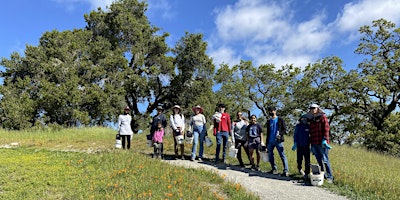Have you ever come home from a hike and realized you tracked a bit of mud from outside into your house?
The introduction of an invasive species can be as easy as that – an invasive plant’s seeds could easily be stuck in the mud on your shoe. Talk about an unwanted guest!
Invasive species are non-native plants, animals or insects that are brought into a new habitat, both accidentally and intentionally. Many of the common plants and creatures you see in our open spaces are actually newcomers to our Northern California ecosystem – there are over 200 invasive plants and creatures in the Bay Area.
After a non-native species colonizes an area, there are certain factors that allow the species to establish themselves in their new habitat. There are several characteristics that are common to many of the species that become invasive, including:
– They grow and reproduce rapidly;
– They can tolerate a wider range of habitat conditions than many native species;
– They have few, if any, natural predators.
Learn more about how these species can impact native ecosystems in this short video:
The impacts of invasive species can include the displacement of native flora and fauna, loss of available habitat and a change in natural ecosystem process. In some cases, a community can adapt to coexist with an invasive species. But, in general, when non-native species invade our open spaces it becomes more difficult for our native species to survive.
Our aim is to protect and maintain habitats for native species to thrive. Acquiring a property is only the first piece of the land preservation puzzle. Together with our partners, we develop land management plans to maintain the property’s ecological health and recreational qualities. Managing and removing invasive species is a big part of this stewardship work.
Stay tuned for my next two blog posts where I will explore how we handle the trickiest invasive species in our open spaces.
Banner image: Much of California’s grasslands have been conquered by invasive species, like the dry grass in this image.
More on Our Website
Event
Volunteer Outside for Earth Day at Pearson-Arastradero Preserve
Pearson-Arastradero Preserve
Posted onAbout Post
Peninsula Open Space Trust (POST) protects open space on the Peninsula and in the South Bay for the benefit of all. Since its founding in 1977, POST has been responsible for saving more than 87,000 acres as permanently protected land in San Mateo, Santa Clara and Santa Cruz counties. Learn more
